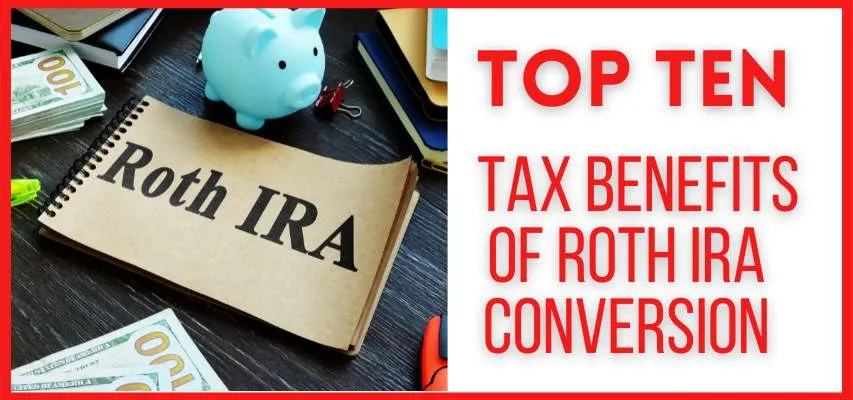Are you considering your retirement savings options? A Roth IRA conversion might be the strategic move you’re looking for. Converting a traditional IRA to a Roth IRA can bring about a host of tax benefits that could significantly impact your financial future. In this article, we’ll delve into the top 10 tax benefits of a Roth IRA conversion, helping you make an informed decision for a secure retirement.
What is a Roth IRA Conversion?
A Roth IRA conversion is a financial maneuver that involves moving funds from a traditional IRA to a Roth IRA. While this process may come with an immediate tax liability, the long-term tax benefits often make it a strategic choice for individuals seeking a tax-efficient approach to retirement planning.
Also Read: Top 10 Reasons to Convert to a Roth IRA
Top 10 Tax Benefits of Roth IRA Conversion
1. Tax Diversification: A Smarter Approach to Taxes
Diversification isn’t limited to investment portfolios alone; it’s also a prudent approach to taxes. A Roth IRA conversion allows you to have both pre-tax and post-tax accounts, offering the flexibility to strategically withdraw funds from different accounts. This approach could potentially help minimize your overall tax burden during retirement.
2. Tax-Free Qualified Distributions: Enjoy the Fruits of Your Investment
Perhaps one of the most enticing aspects of a Roth IRA is the prospect of tax-free qualified distributions. Unlike traditional IRAs where withdrawals are subject to taxation, qualified distributions from a Roth IRA are entirely tax-free, providing you with more spendable income during your retirement years.
3. No Required Minimum Distributions (RMDs): Retain Control Over Your Savings
Unlike traditional IRAs that mandate required minimum distributions (RMDs) at a certain age, Roth IRAs offer a breath of fresh air. With a Roth IRA, you’re not required to take minimum distributions during your lifetime, allowing your investments to continue growing tax-free for as long as you wish.
4. Potential for Reduced Medicare Premiums: A Healthier Approach to Finances
Proactively managing your income during retirement can have positive effects on your Medicare premiums. By strategically withdrawing funds from your Roth IRA, you might be able to reduce your Medicare Part B and Part D premiums, leading to potentially substantial savings in healthcare costs.
5. Passing on Wealth: A Lasting Legacy for Your Loved Ones
A Roth IRA can play a pivotal role in your estate planning strategy. Inherited Roth IRAs offer your beneficiaries the advantage of tax-free distributions, allowing you to pass on your wealth and financial wisdom to your loved ones in a tax-efficient manner.
6. Hedge Against Future Tax Rate Increases: Shielding Your Retirement from Uncertainty
The landscape of tax rates can be unpredictable. By opting for a Roth IRA conversion, you make a strategic move to potentially safeguard your retirement funds from future tax rate increases. Paying taxes on the conversion amount today might be a wise move to avoid potentially higher tax rates down the road.
7. Estate Planning Flexibility: Tailoring Your Legacy
For those who prioritize estate planning, a Roth IRA conversion can be a potent tool. It empowers you to leave a tax-free financial legacy to your heirs, granting them a substantial advantage as they navigate their financial futures.
8. Tax-Free Withdrawals for Early Retirees: Embracing Financial Freedom
If you’re contemplating an early retirement, a Roth IRA conversion can offer unique advantages. It allows you to withdraw your converted amounts without facing the typical early withdrawal penalties, providing you with financial flexibility during the earlier stages of your retirement journey.
9. Recharacterization Option: Adapting to Changing Circumstances
Life is unpredictable, and circumstances can change. Fortunately, a Roth IRA conversion offers a safety net in the form of the recharacterization option. If your financial situation changes post-conversion, you have the flexibility to undo the conversion and adapt to new realities.
10. Safeguarding Against Legislative Changes: Preserving Your Tax Advantages
Tax laws are subject to change, but the benefits of a Roth IRA conversion can be preserved. By converting now, you lock in the current tax rates, safeguarding your financial advantages against potential future legislative shifts.
Conclusion
In conclusion, a Roth IRA conversion is not merely a financial transaction; it’s a strategic move that can have a profound impact on your retirement journey. The assortment of tax benefits, from tax-free distributions to enhanced estate planning opportunities, makes the decision to convert a matter of careful consideration and personalized financial planning. By embracing the advantages of a Roth IRA conversion, you pave the way for a more tax-efficient and financially secure retirement.
Q: What are the tax rules for a Roth IRA conversion?
A: When you convert money from a traditional IRA or 401(k) to a Roth IRA, you must pay taxes on the converted amount in the year of the conversion. The amount of tax you pay will depend on your income tax bracket and income tax rate.
Q: Who benefits most from a Roth IRA conversion?
A: It may be a good option for people who expect to be in a higher tax bracket in retirement than they are now. It may also be a good option for people who want to have more flexibility with their retirement savings.
Q: What are the risks of a Roth IRA conversion?
A: There are a few risks associated with the conversion. One risk is that you may have to pay more taxes now than you would if you left your money in a traditional IRA. Another risk is that you may not be able to afford to pay the taxes on the converted amount.
conversion. One risk is that you may have to pay more taxes now than you would if you left your money in a traditional IRA. Another risk is that you may not be able to afford to pay the taxes on the converted amount.
Q: How do I decide if a Roth IRA conversion is right for me?
A: If you are considering a Roth IRA conversion, it is important to talk to a financial advisor to see if it is the right option for you. Your financial advisor can help you assess your individual circumstances and determine if a Roth IRA conversion makes sense for you.


































